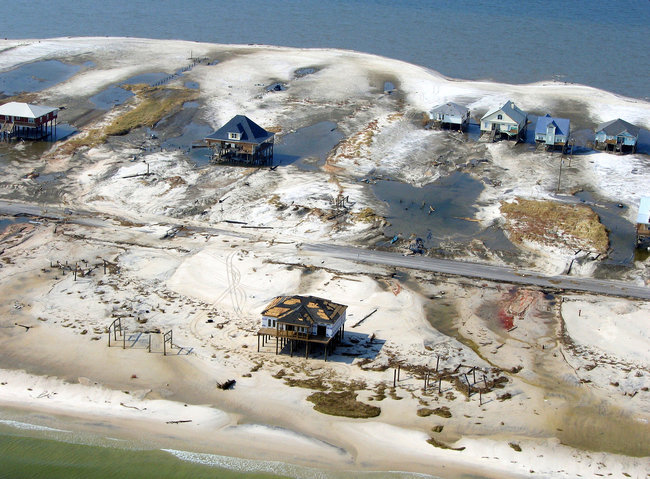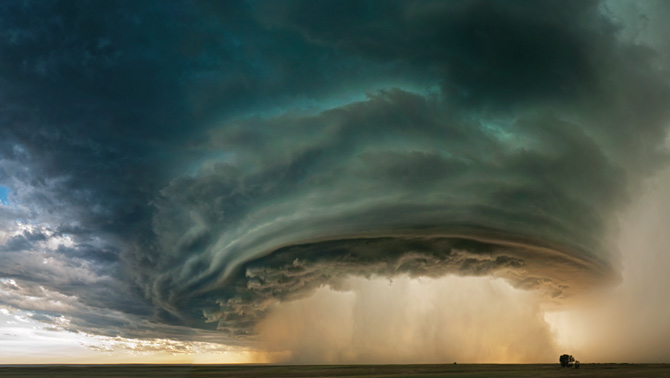Serendip is an independent site partnering with faculty at multiple colleges and universities around the world. Happy exploring!
Rebuilding after Disaster: What makes "sense"?

I'm having a weather-conscious Monday: 2 things happened.
#1. At breakfast, I saw an article on the front page of the Times, "As Coasts Rebuild and U.S. Pays, Repeatedly, the Critics Ask Why." The title pretty much sums up the article - What are we going to learn from Sandy & other weather events? Are we being financially and/or ecologically responsible? (short answer: no.)

- the federal government spends TONS of money on rebuilding coastal properties (one example was Dauphin Island): "Tax money will go toward putting things back as they were, essentially duplicating the vulnerability that existed before the hurricane…. At least $80 million, adjusted for inflation, has gone into patching up this one island since 1979 — more than $60,000 for every permanent resident. That does not include payments of $72 million to homeowners from the highly subsidized federal flood insurance program."
- this trend/reaction is not fiscally responsible, nor is it environmentally conscious… but maybe a huge event like Sandy will shed some light on this trend, and will lead to some questioning: “'The best thing that could possibly come out of Sandy is if the political establishment was willing to say, ‘Let’s have a conversation about how we do this differently the next time,’' said Dr. Young, a coastal geologist who directs the Program for the Study of Developed Shorelines at Western Carolina University. 'We need to identify those areas — in advance — that it no longer makes sense to rebuild.'"
- Politics complicates everything: "Given the political realities, however, it is by no means clear how to move forward." (this reminded me of Merchant's conclusive statements in Radical Ecology: despite having a lot of ideas and beliefs, real activism is difficult because the theory/movement "lacks coherence" (251). Where do we start? What is the priority? Who decides?)
- One solution is putting together buyout proposals - the federal government would "buy out vulnerable property owners" rather than spend money on repairs repeatedly over time. But no one wants to "retreat;" also, a proposal would take a long time to put together, and would cost a lot, all at once.
So, basically, what I got from this: everything is at odds with everything else - Science and economics and an ability to respond to/relate to the environment are at a disconnect. No one wants to make a decision, or look at long-term planning. And I thought of Unspoken Hunger: We are impoverished because we can't make these connections, and "our lack of intimacy with each other is in direct proportion to our lack of intimacy with the land" (Williams 65).
Also, this is still a reactionary stance - we aren't even considering how global changes, rising ocean levels, etc could be addressed. We're only dealing with a symptom of a greater problem, and clearly, not dealing with it well.
#2. The second thing to look at: these events happen over time, and it seems that, lately, weather events are bigger and happening more often.

I was at the gym today, and I picked up a copy of National Geographic, from this September. The article "Weather Gone Wild," caught my attention. As I read, I was thinking of Hurricane Sandy, one more statistic to add to the pile. There are several photos of weather events that have taken place over the last 3 years on their website.
""There’s been a change in the weather": The earth is getting warmer, so oceans are getting warmer, there is more water vapor in the air, which increases "the potential for intense rainfalls." Our current weather models can't really predict how this will affect other storms, like tornadoes or hurricanes. And, as we've seen with Sandy most recently, even if it isn't as clear in regular weather patterns, "global warming… has changed the odds for extreme weather." The article went on to describe the effects of extreme weather on individuals, towns, and states.
Also: Change in the weather = financial impact. "Losses from [extreme] events helped push the cost of weather disasters in 2011 to an estimated $150 billion worldwide, a roughly 25 percent jump from the previous year. In the U.S. last year a record 14 events caused a billion dollars or more of damage each, far exceeding the previous record of nine such disasters in 2008."
So I'm seeing a pattern - one of the ways to get people's attentions is by stating statistics that involve taxes/expenses - money talks. What isn't clear is whether we (the consumers of this information) are actively/effectively responding to this information; if not, do we need to hear something different? Why are the multiple stories summarized from a financial perspective?
What would make sense (cents)?



Comments
Rising Water
This is such a pertinent issue in today’s world. What is the best way to spend our money as far as the environment goes? And as we pondered in class, which is the radical decision, to remake developed coastlines that have been washed away, or to not remake them? I think by far, the more radical idea is to not remodel coastlines that have been blown away by storms. This is against the norm, but makes so much more sense ecologically and economically.
I think what makes even more sense ecologically is not only not rebuilding, but moving away from the coastlines entirely. I read this article this morning: http://www.nytimes.com/2012/11/25/opinion/sunday/is-this-the-end.html?ref=todayspaper
T. S. Eliot says “Fear death by water,” and the author of the article agrees. The reality is that people are not going to pay for expensive levees in the New York harbor. I think we have to live with the fact that waters are going to keep rising. The bad news is that we have to learn to adapt, but the good news is also that we must learn to adapt. Maybe being forced to adapt to a new situation would make us think and build smarter. Who knows?
from 1948:
"A system of conservation based soley on economic self-interest is hopelessly lopsided. It tends to ignore, and thus eventually to eliminate, many elements in the land community that lack commercial value, but that are (as far as we know) essential to its healthy functioning. It assumes, falsely, I think, that the economic parts of the biotic clock will function without the uneconomic parts. It tends to regulate to government many functions evenutally too large, too complex, or too widely dispersed to be performed by government" (Aldo Leopold)